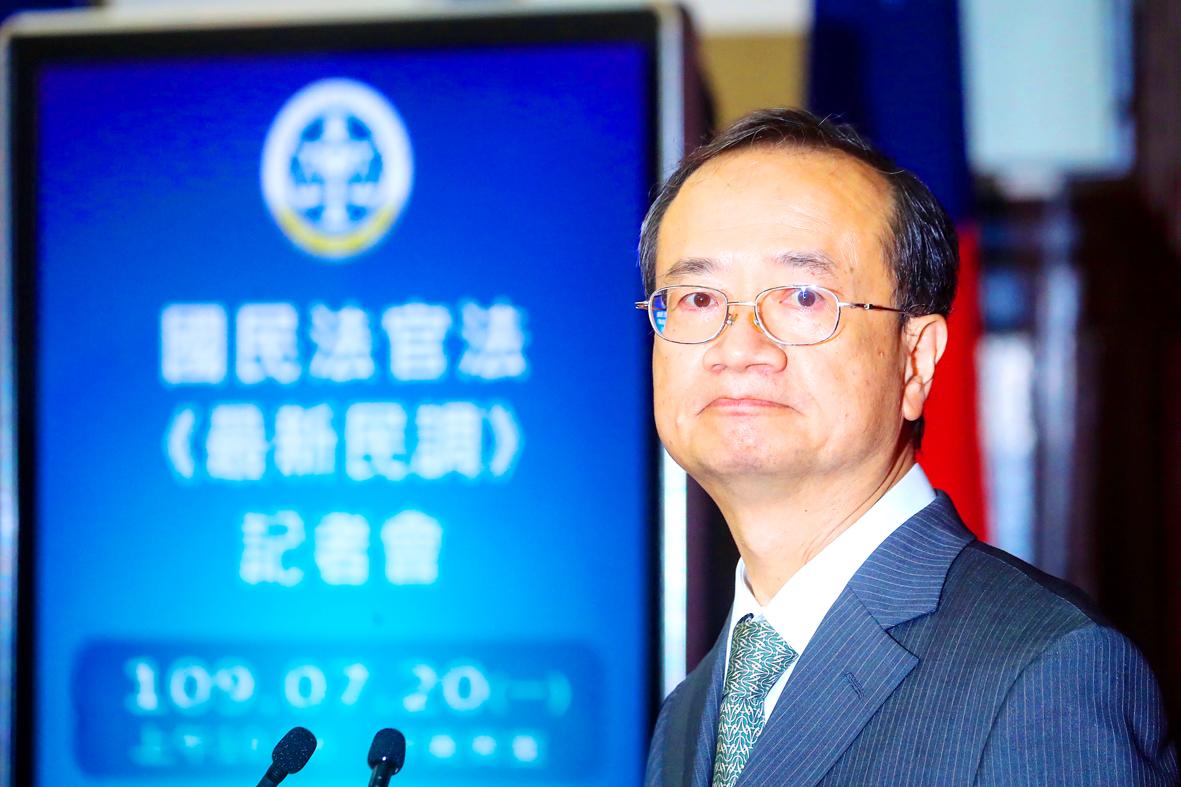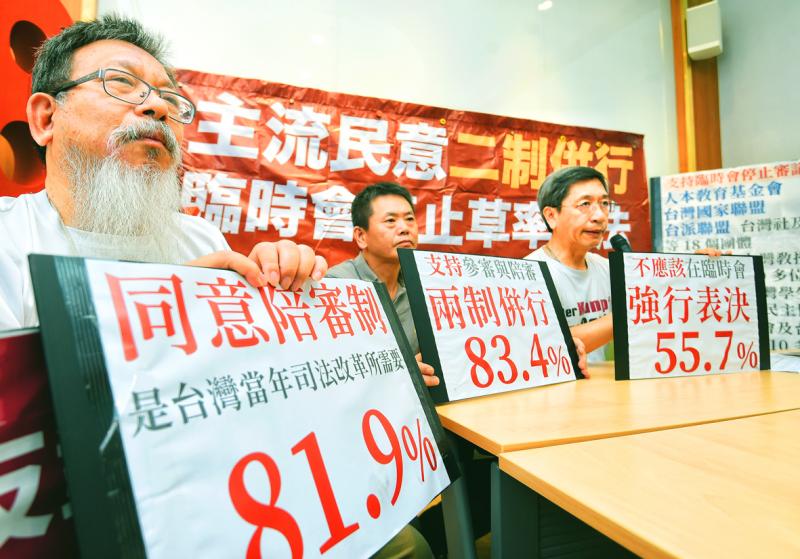Lawmakers yesterday in an extraordinary legislative session began reviewing the Judicial Yuan’s proposed bill for citizen participation in criminal court procedures and passed a second reading to rename the proposed “citizen participation in criminal trial procedures act” to the proposed “national judge act.”
The proposed lay judge system would comprise three professional judges and six citizen judges, and operate on a “joint deliberation and joint ruling” model.
Lawmakers later in a 54-18 vote approved a motion raised by the Democratic Progressive Party (DPP) caucus to continue the review meeting until midnight.

Photo: CNA
Earlier yesterday, the Judicial Yuan released a survey that showed most people were in favor of a lay judge system.
According to the poll, 72.91 percent of respondents agreed that having citizens discuss criminal trials with judges could result in verdicts that are consistent with the law and that meet people’s expectations, Judicial Yuan President Hsu Tzong-li (許宗力) said, adding that more than 80 percent approved of having professional judges attend final deliberations to decide on a ruling.
More than 94 percent of respondents said that in criminal trials using a lay judge system, the ruling should provide the reason for the verdict, while 97 percent said defendants should have the right to appeal rulings, he added.

Photo: Fang Pin-chao, Taipei Times
“The survey shows that a large majority of the public supports citizens working together with judges under the ‘joint deliberation and joint ruling’ model. In comparison, typical jury systems in principle do not allow appeals, and have no requirement to submit reasons for the verdict,” Hsu said.
“There is no perfect way, nor a most advanced judicial system. The one that can best adapt to our native environment and judicial framework, which comes closest to fulfilling people’s expectations ... is the Judicial Yuan’s lay judge system, which right now is best suited to the nation’s needs and the public’s demands,” he added.
The survey was conducted by the ERA Survey Research Center from July 10 to Tuesday last week. It collected 1,074 valid responses and has a margin of error of 3 percentage points.
However, another survey released yesterday by a group of legal reform advocates showed that 81.9 percent were in favor of a jury system, 63.2 percent supported a lay judge system and 83.4 percent backed a “twin track” proposal.
The survey was conducted by the Taiwanese Public Opinion Foundation on Monday and Tuesday last week. It gathered 1,078 valid responses and has a margin of error of 2.98 percentage points.
“The DPP government repealed its party charter by excluding the jury system and ran contrary to the prevailing views of Taiwanese. We hope lawmakers will not pass [the proposal’s] third reading,” Judicial Reform Foundation chairman Lin Yung-sung (林永頌) told a news conference.
The survey results released by the Judicial Yuan “looked like a paid promotion,” Lin said.
“The DPP often uses extraordinary legislative session to deal with major bills, as no subcommittee meetings or public hearings are held, with only lawmakers voting. This is the ruling party’s arrogance and the majority bullying the minority in the legislature,” Chinese Nationalist Party (KMT) caucus whip Lin Wei-chou (林為洲) told the same news conference.
Taiwan People’s Party Legislator Jang Chyi-lu (張其祿), who also attended the news conference, accused the DPP of using “violence of majority vote” to run roughshod over opposition parties.
“Taiwanese have pursued a jury system for more than a century. We hope the DPP can stop its actions, as it should not force through a bill during the current session without a full deliberation process,” New Power Party caucus whip Chiu Hsien-chih (邱顯智) said.
Additional reporting by Hsieh Chun-lin

US President Donald Trump said "it’s up to" Chinese President Xi Jinping (習近平) what China does on Taiwan, but that he would be "very unhappy" with a change in the "status quo," the New York Times said in an interview published yesterday. Xi "considers it to be a part of China, and that’s up to him what he’s going to be doing," Trump told the newspaper on Wednesday. "But I’ve expressed to him that I would be very unhappy if he did that, and I don’t think he’ll do that," he added. "I hope he doesn’t do that." Trump made the comments in

NOT AN OPENING: Trump’s violation of international law does not affect China’s consideration in attacking Taiwan; Beijing lacks capability, not precedent, an official said Taiwanese officials see the US’ capture of the president of Venezuela as a powerful deterrent to Beijing’s aggression and a timely reminder of the US’ ability to defeat militaries equipped with Chinese-made weapons. The strikes that toppled Venezuelan President Nicolas Maduro signaled to authoritarian leaders, including Chinese President Xi Jinping (習近平), US President Donald Trump’s willingness to use military might for international affairs core to US interests, one senior official in Taipei’s security circle said. That reassured Taiwan, the person said. Taipei has also dismissed the idea that Trump’s apparent violation of international law could embolden Beijing, said the official, who was not

A cold surge advisory was today issued for 18 cities and counties across Taiwan, with temperatures of below 10°C forecast during the day and into tonight, the Central Weather Administration (CWA) said. New Taipei City, Taipei, Taoyuan and Hsinchu, Miaoli and Yilan counties are expected to experience sustained temperatures of 10°C or lower, the CWA said. Temperatures are likely to temporarily drop below 10°C in most other areas, except Taitung, Pingtung, Penghu and Lienchiang (Matsu) counties, CWA data showed. The cold weather is being caused by a strong continental cold air mass, combined with radiative cooling, a process in which heat escapes from

Snow this morning fell on Alishan for the first time in seven years, as a strong continental cold air mass sent temperatures plunging across Taiwan, the Central Weather Administration (CWA) said. The Alishan weather station, located at an elevation of about 2,200m in central Taiwan, recorded snowfall from 8:55am to 9:15am, when the temperature dropped to about 1°C, the CWA said. With increased moisture and low temperatures in the high-altitude Alishan area, the conditions were favorable for snow, CWA forecaster Tsai Yi-chi (蔡伊其) said. The last time snow fell at the Alishan weather station was on Jan. 10, 2018, while graupel fell there